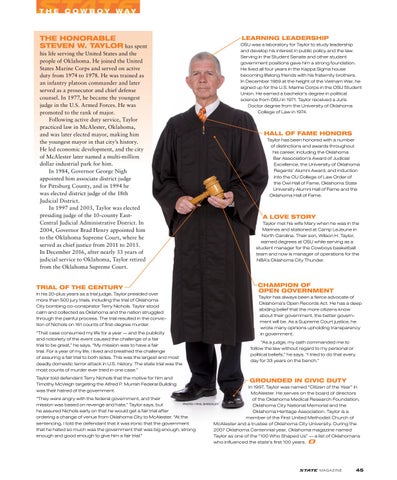THE HONORABLE STEVEN W. TAYLOR has spent his life serving the United States and the people of Oklahoma. He joined the United States Marine Corps and served on active duty from 1974 to 1978. He was trained as an infantry platoon commander and later served as a prosecutor and chief defense counsel. In 1977, he became the youngest judge in the U.S. Armed Forces. He was promoted to the rank of major. Following active duty service, Taylor practiced law in McAlester, Oklahoma, and was later elected mayor, making him the youngest mayor in that city’s history. He led economic development, and the city of McAlester later named a multi-million dollar industrial park for him. In 1984, Governor George Nigh appointed him associate district judge for Pittsburg County, and in 1994 he was elected district judge of the 18th Judicial District. In 1997 and 2003, Taylor was elected presiding judge of the 10-county EastCentral Judicial Administrative District. In 2004, Governor Brad Henry appointed him to the Oklahoma Supreme Court, where he served as chief justice from 2011 to 2013. In December 2016, after nearly 33 years of judicial service to Oklahoma, Taylor retired from the Oklahoma Supreme Court.
TRIAL OF THE CENTURY In his 20-plus years as a trial judge, Taylor presided over more than 500 jury trials, including the trial of Oklahoma City bombing co-conspirator Terry Nichols. Taylor stood calm and collected as Oklahoma and the nation struggled through the painful process. The trial resulted in the conviction of Nichols on 161 counts of first-degree murder. “That case consumed my life for a year — and the publicity and notoriety of the event caused the challenge of a fair trial to be great,” he says. “My mission was to have a fair trial. For a year of my life, I lived and breathed the challenge of assuring a fair trial to both sides. This was the largest and most deadly domestic terror attack in U.S. history. The state trial was the most counts of murder ever tried in one case.” Taylor told defendant Terry Nichols that the motive for him and Timothy McVeigh targeting the Alfred P. Murrah Federal Building was their hatred of the government.
LEARNING LEADERSHIP OSU was a laboratory for Taylor to study leadership and develop his interest in public policy and the law. Serving in the Student Senate and other student government positions gave him a strong foundation. He lived all four years in the Kappa Sigma house becoming lifelong friends with his fraternity brothers. In December 1969 at the height of the Vietnam War, he signed up for the U.S. Marine Corps in the OSU Student Union. He earned a bachelor’s degree in political science from OSU in 1971. Taylor received a Juris Doctor degree from the University of Oklahoma College of Law in 1974.
HALL OF FAME HONORS Taylor has been honored with a number of distinctions and awards throughout his career, including the Oklahoma Bar Association’s Award of Judicial Excellence, the University of Oklahoma Regents’ Alumni Award, and induction into the OU College of Law Order of the Owl Hall of Fame, Oklahoma State University Alumni Hall of Fame and the Oklahoma Hall of Fame.
A LOVE STORY Taylor met his wife Mary when he was in the Marines and stationed at Camp LeJeune in North Carolina. Their son, Wilson H. Taylor, earned degrees at OSU while serving as a student manager for the Cowboys basketball team and now is manager of operations for the NBA’s Oklahoma City Thunder.
CHAMPION OF OPEN GOVERNMENT Taylor has always been a fierce advocate of Oklahoma’s Open Records Act. He has a deep abiding belief that the more citizens know about their government, the better government will be. As a Supreme Court justice, he wrote many opinions upholding transparency in government. “As a judge, my oath commanded me to follow the law without regard to my personal or political beliefs,” he says. “I tried to do that every day for 33 years on the bench.”
GROUNDED IN CIVIC DUTY
In 1997, Taylor was named “Citizen of the Year” in McAlester. He serves on the board of directors “They were angry with the federal government, and their of the Oklahoma Medical Research Foundation, PHOTO / PHIL SHOCKLEY mission was based on revenge and hate,” Taylor says, but Oklahoma City National Memorial and the he assured Nichols early on that he would get a fair trial after Oklahoma Heritage Association. Taylor is a ordering a change of venue from Oklahoma City to McAlester. “At the member of the First United Methodist Church of sentencing, I told the defendant that it was ironic that the government McAlester and a trustee of Oklahoma City University. During the that he hated so much was the government that was big enough, strong 2007 Oklahoma Centennial year, Oklahoma magazine named enough and good enough to give him a fair trial.” Taylor as one of the “100 Who Shaped Us” — a list of Oklahomans who influenced the state’s first 100 years.
45
